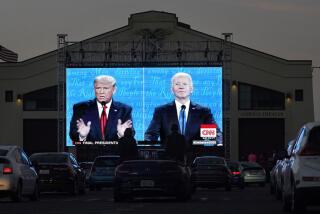Bush, Putin Meet to Show End of Tensions
Of all the world leaders at the United Nations this week, only one -- Russia’s Vladimir V. Putin -- is enjoying a coveted follow-up trip to President Bush’s Camp David retreat. The invitation was designed to highlight the end of tensions with Moscow over the war in Iraq and Putin’s growing importance as a “partner” in foreign policy.
Coming on the heels of Bush’s visit this week to the U.N. General Assembly, this weekend’s Camp David summit could also serve as a reminder to France and Germany that cooperation with the United States has its benefits.
Yet even though Washington and Moscow may reach new understandings over Iraq’s reconstruction and Iran’s nuclear programs, analysts described the summit’s agenda as limited.
“It’s an effort to put a gloss on what has really been a prickly relationship,” said Fiona Hill, a Russia expert at the Brookings Institution.
Putin flew by helicopter to Camp David late Friday afternoon and quickly zipped off in a golf cart with Bush toward the lodge where the leaders were to spend the better part of two days in leafy isolation.
The schedule called for a social dinner Friday followed by formal talks and a working lunch today.
The top item on both countries’ agendas is expected to be Iraq.
Putin has already indicated that Russia would not stand in the way of a U.N. Security Council resolution authorizing member nations to help in the occupation and reconstruction of Iraq. But to increase the legitimacy of the resolution, Bush would like to persuade the Russians to vote in favor of the resolution, not simply abstain.
Bush also wants to hear what kind of financial or military assistance Russia might be willing to lend in Iraq. Because of Russia’s difficult economic situation and the strong anti-Americanism of its military, few expect Moscow to come forward with cash or significant numbers of troops.
But U.S. officials would be grateful even for token contributions -- for some specialized rescue brigades or security services, for instance, and for intelligence sharing.
And if Russia were to cancel some of the billions of dollars of Iraqi debt it is owed, that could speed the country’s postwar recovery.
In return, Russia wants guarantees that its companies will not be cut out of the bidding for lucrative reconstruction contracts. And it wants Washington to agree to let the United Nations take a more central role in directing Iraq’s economic and political redevelopment.
Close behind Iraq on the agenda is Iran. The Islamic Republic’s nuclear ambitions have long been a priority for the United States, in particular the nuclear power plant Russians are building in the Iranian city of Bushehr. Despite fears that the reactor could be used to make weapons-grade uranium, Russians have insisted that the U.S. was trying to horn in on a profitable commercial venture.
In recent weeks, the outlines of a possible deal on Bushehr have emerged. Russian nuclear officials are close to reaching an agreement with the Iranians under which they would retain control of the fuel in the reactor and return it to Russia for disposal.
“I believe the Russians are ready to take a strong position on Iran,” said Rose Gottemoeller, who worked on the Bushehr issue in the Clinton administration and is a nonproliferation expert at the Carnegie Endowment for International Peace.
The other topic of mutual interest for Bush and Putin is the U.S.-declared “war on terror,” although each side defines it somewhat differently.
Russia argues that its campaign against rebels in its separatist republic of Chechnya is part and parcel of the U.S. effort to stamp out Al Qaeda. U.S. officials, however, plan to warn Russia privately that the unrest in Chechnya threatens to create a greater security threat for both countries.
The administration has said that upcoming elections in Chechnya cannot be considered legitimate because of violence against opposition candidates and breaches of election rules.
But Bush is unlikely to go far enough to satisfy human rights activists in Russia and abroad who believe that the United States has been too lenient with the Russian government, whose troops have been accused of abuses in the republic.
“Why do they have to dance around it? Why does it have to be handled so delicately that it’s practically invisible?” asked Rachel Denber, a Russia expert at Human Rights Watch. “What’s said in public is so much more important than what is said in private. And besides, there is no evidence that private diplomacy is working.”
Hill, the Brookings analyst, disagreed somewhat. She argued that Putin’s decision to bring his handpicked choice for Chechen leader, Akhmad Kadyrov, with him to the United Nations and to Washington reflected an effort to counter earlier U.S. criticism of Chechen policies.
Unfortunately for Putin, the effort to legitimize Kadyrov appears to have backfired. Kadyrov’s security forces are accused of human rights violations and election abuses, and U.S. officials made it clear he would not be welcome at Camp David.
In an interview Friday, Kadyrov called the accusations “lies and gossip.”
“I’m offended when people don’t believe what I say and they believe people who have never been in Chechnya, who don’t know the Chechen people,” he said.
In the end, the most visible results of the Camp David summit may be several agreements on more minor issues, such as trade disputes and humanitarian cooperation. But those agreements, along with discussions on the big topics, may be enough to keep the partnership on track.
More to Read
Start your day right
Sign up for Essential California for news, features and recommendations from the L.A. Times and beyond in your inbox six days a week.
You may occasionally receive promotional content from the Los Angeles Times.






